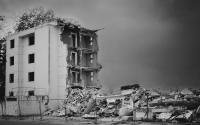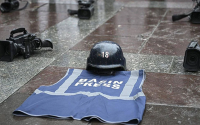25 June 2007AlertnetJeremy Lovell
Global warming is such a threat to security that military planners must build it into their calculations, the head of Britain's armed forces said on Monday.
Jock Stirrup, chief of the defence staff, said risks that climate change could cause weakened states to disintegrate and produce major humanitarian disasters or exploitation by armed groups had to become a feature of military planning. But he said first analyses showed planners would not have to switch their geographical focus, because the areas most vulnerable to climate change are those where security risks are already high. "Just glance at a map of the areas most likely to be affected and you are struck at once by the fact that they are exactly those parts of the world where we see fragility, instability and weak governance today. "It seems to me rather like pouring petrol onto a burning fire," Stirrup told the Chatham House think-tank in London. British Foreign Secretary Margaret Beckett chaired the first debate on climate change at the U.N. Security Council in April this year. She argued that the potential for climate change to cause wars meant it should be on the council's radar. Stirrup said the unpredictability of the immediate effects of global warming on rainfall patterns and storms meant flashpoints could be advanced by years without warning. He did not identify the problem areas, but Bert Metz of the U.N.'s Intergovernmental Panel on Climate Change told the meeting they included Central America, the Amazon Basin, large parts of north, central and southern Africa and swathes of Asia. Scientists say average temperatures will rise by between 1.8 and 4.0 degrees Celsius this century due to burning fossil fuels for power and transport, melting ice caps, bringing floods, droughts and famines, and putting millions of lives at risk. Stirrup said the security threat was far more immediate than those figures might suggest. "If temperatures rise towards the upper end of the forecast range we could already start to see serious physical consequences by 2040 -- and that is if things get no worse." "If things do get worse you don't need to come very much forward from 2040 before, in my terms at least, you are talking about the day after tomorrow," Stirrup said. He said the Sept. 11, 2001 attacks on New York and Washington showed the devastation that attacks fuelled by political, economic and social deprivation could achieve. "Now add in the effects of climate change. Poverty and despair multiply, resentment surges and people look for someone to blame," he said. Even if the world agreed quickly on a way of equitably tackling the climate crisis -- which was far from sure -- the nature of the problem meant a significant degree of adverse change was already in the pipeline. "That rapidity, alongside the size of the global population and the complexity of today's society, leaves us particularly vulnerable," Stirrup said. "It is bound to present substantial security challenges of one kind or another." Asked on the margins of the meeting if that meant military planners should opt for premptive action where they saw a security crisis emerging, he said: "Only in the sense of building governance. Recognising the problem is the first step."





